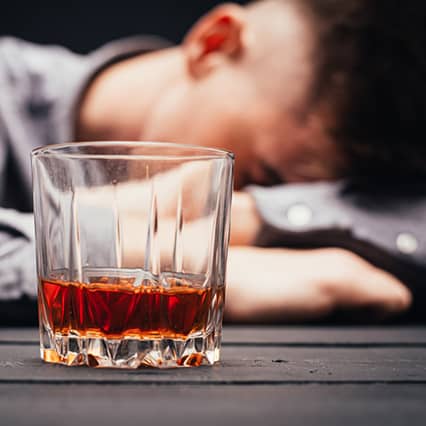
Alcohol Detox Orange County
- Customized Alcohol Detox in Orange County at Hotel California by the Sea
- Evidence-based Alcohol Treatment in Newport Beach
- How does our Alcohol Treatment in Newport Beach define Alcohol Withdrawal?
- Symptoms of Alcohol Withdrawal at the detox center in Orange County
- What is Delirium Tremens?
- The Detox timeline at our Alcohol Treatment Center in Orange County
- The detoxification process at our Alcohol Treatment in Newport Beach, California
- I have completed detox, what are the next steps?
- Request a Call
Alcohol detox at our Orange County, California facility is the process of medically and safely removing alcohol contents from a person’s body. Depending on each patient’s severity of their alcohol dependence, this process can take anywhere from a week to a month.
Detox is the initial period of rehab in which patients participate in medical treatments to overcome their dependency on alcohol. At our alcohol treatment center in Orange County, the timeline for detox will depend on each patient. Contributing factors for the length of treatment include the severity of their addiction and progress as evaluated by rehab clinicians.
Alcohol Use Disorder (AUD) is when an individual is unable to control their drinking habits despite repeated negative outcomes. Studies have shown AUD can have major lasting effects on the brain. Seeking professional alcohol detox is encouraged to help individuals live a healthier life without alcohol.
Our Southern California alcohol detox center in Orange County is fully equipped to assist clients through the initial phase of addiction recovery. During detox at the alcohol treatment center in Orange County, patients abstain from drinking. This delicate process gives their bodies time to adjust and physically relearn how to function without the substance.
OR:
Request a Call

Customized Alcohol Detox in Orange County at Hotel California by the Sea
As the first step in the alcohol detox process, patients are immediately given a biopsycho social assessment (BPS). This determines if any biological, psychological or social factors have contributed to the patient’s alcohol addiction.
At our alcohol treatment centers in Orange County, an in-depth health and medical history of the patient is evaluated. This allows clinicians to create an effective treatment plan for alcohol detox. A clinical team is immediately assigned to each patient. This ensures their specific needs will be addressed throughout their stay at the facility.
In our alcohol detox in Orange County, California, we are Incidental Medical Services (IMS) certified. Our medical physicians and certified nurses are ready to assist patients through the alcohol detox process.
Our IMS services offer a full spectrum of evidence-based treatments for alcohol recovery within our rehab in Orange County. Consistent monitoring of a patient’s health status during their withdrawal phase is critical. Patients are also supervised during the usage of approved medication during alcohol detox.
Patients will receive daily assessments with a medical doctor to adjust tapers and other medications accordingly. Nurses and other medical staff work around the clock to monitor vital signs every four hours. This ensures patients are able to detox comfortably and safely.
Residential detox facilities at our alcohol treatment in Newport Beach, offers a comfortable and relaxing environment located by beautiful beaches. Facilities features around the clock staff, a gourmet personal chef, and a serene environment. This allows patients to focus on their health and healing from alcohol addiction.
Evidence-based Alcohol Treatment in Newport Beach
Patients suffering from alcohol addiction have many avenues of treatment to choose from at our alcohol detox in Orange County. Treatment methods include detox, medical withdrawal management and comprehensive therapies. Our treatment facilities specialize in alcohol detox including inpatient residential (RTC) programs. Here, patients are monitored 24/7 and given the appropriate care during this initial critical step toward sobriety.
Medical withdrawal management is effective in targeting specific patient needs and focuses on treating the physical damage caused by alcohol addiction. Treating alcohol detox with assisted medication is a safe way for patients experiencing severe withdrawal symptoms. Detoxing from alcohol is known to be one of the more dangerous forms of detox. Because of this, patients are encouraged to seek out a medically managed detox treatment plan at our rehab in Orange County.
Loading…Medical Withdrawal Management
The usage of FDA-approved medications to aid in alcohol detox in Orange County, is common practice in alcoholism treatment. At our Orange County rehab, Medication-Assisted Therapy (MAT) is a popular treatment for those suffering from Alcohol Use Disorder (AUD). It is a safe way for patients to detox from alcohol.
Common medications used to assist in alcohol rehab include:
- Naltrexone - a drug used to help reduce alcohol cravings because it physically stimulates withdrawal symptoms. These unpleasant withdrawal symptoms are supposed to deter the patient from turning to their cravings.
- Acamprosate - this drug is used to help patients reduce alcohol cravings and is usually administered after the initial alcohol detox has been completed.
- Disulfiram - this drug is similar to Acamprosate in that it produces severe physical reactions when alcohol is consumed. Some symptoms that occur include nausea, headaches and low blood pressure.
How does our Alcohol Treatment in Newport Beach define Alcohol Withdrawal?
Alcohol is known as a depressant that impairs and slows down brain functions making it difficult for coordination and judgment. Long-term users of alcohol become dependent on the substance to feel “normal.”
Excessive alcohol intake can alter a brain’s cognitive chemistry and biology. Over time, it begins to feel “normal” to have alcohol in the system. When the individual decides to stop consuming alcohol, the body will react to not feeling “normal” and experience alcohol withdrawal.
Alcohol Withdrawal is a collection of physical and psychological symptoms binge drinkers experience when they stop consuming alcohol. Some of these symptoms can be mild and in other cases can be very dangerous depending on each individual.
Symptoms of Alcohol Withdrawal at the detox center in Orange County
Alcohol withdrawal symptoms can depend on each individual patient. How long have you been drinking? Have you been drinking and using other substances?
These are important factors in determining the intensity of alcohol withdrawal symptoms. Some of the most common symptoms include:
- Anxiety and depression
- Agitation and confusion
- Shaking and tremors
- Headaches
- Nausea and vomiting
- Decreased appetite
- Heart palpitations and high blood pressure
- Insomnia and fatigue
- Fever and Sweating
What is Delirium Tremens?
Delirium Tremens (DT) is a condition of extreme withdrawal during alcohol detox. This usually occurs in patients who suffer from severe alcohol addiction.
Symptoms of DT usually occur within 2 to 3 days after a person has stopped drinking. Some of the most common symptoms of DT include:
- Hallucinations
- Increased sensitivity to sound and light
- Intense confusion and emotional distress
- Fever
- The most severe cases can cause seizures
Delirium Tremens are considered an extreme medical condition in which patients should seek professional healthcare treatment.
The Detox timeline at our Alcohol Treatment Center in Orange County
The alcohol withdrawal timeline varies greatly on each patient and the severity of their alcohol addiction. There are four main stages of symptoms patients experience during our alcohol detox in Orange County. The first stage could start within the first 12 hours after alcohol consumption.
The intensity of symptoms range from mild, moderate to severe. The process generally lasts about a week. Treatment can be extended depending on the needs of each patient and their ability to undergo the detox treatment.
First 12 Hours
During the first 12 hours of alcohol detox in Orange County, California, patients will begin to experience withdrawal symptoms. These symptoms can include sweating, nausea, agitation and mild hand tremors. These are considered “mild” symptoms and can occur as soon as six hours after the last drink.
Some patients may even experience digestive issues and feelings of an upset stomach.
1-3 Days
In between the 24 to 48-hour period, withdrawal symptoms will increase with intensity. In addition to the “mild” symptoms, patients may experience increased blood pressure and heart rate as well as abnormal breathing. These physical symptoms are typical for patients as they move into the next phase.
During this second phase of alcohol detox, patients will also begin to experience hallucinations. During hallucinations, a person begins to see, hear and feel things that aren’t actually there.
1 Week
Patients with severe addictions may experience intense hallucinations, confusion and even Delirium Tremens (DT). DT causes intense fever and severe emotional distress and often requires hospitalization or clinical care. During this critical phase of alcohol detox, it is important to be under medical supervision. Symptoms of DT can be very dangerous and life threatening.
Once these major symptoms have made their way through the patient's body, all withdrawal symptoms will slowly begin to subside. There are some exceptionally rare cases in which withdrawal symptoms can last for weeks or months after initial alcohol detox.
Beyond
Alcohol detox symptoms usually begin to subside after about a week of detox. In some cases, it can be prolonged and Post Acute Withdrawal Syndrome (PAWS) is developed. The most common residual symptoms of PAWS include irritability, increased anxiety and depression and difficulty with everyday cognitive tasks. With PAWS some of the symptoms can last up to several weeks or months after initial detox.
After about a week after alcohol detox, patients will continue through the alcohol rehab process. Patients will seek out other available patient services to help maintain sobriety. Following our medically assisted alcohol detox, patients are led through the next process of healing.
The next steps include inpatient residential and outpatient programs at our alcohol treatment center in Newport Beach. Here, patients will receive individualized therapies to address the emotional issues related to their alcohol addiction.
Specialized therapy programs teach patients new skills and habits to incorporate into their new lives free of substance dependency. Other additional services may include family support therapy, assistance in finding transitional sober living and career counseling.

The detoxification process at our Alcohol Treatment in Newport Beach, California
The alcohol detox process at our detox center in Orange County is generally categorized into three different phases: Intake, Medication and Stabilization. The best interest of the patient is taken into consideration in order to smoothly and safely guide them throughout detox. At the alcohol detox in Orange County, each patient is monitored and given the most effective treatment.
Intake
During the intake step, the medical team will perform physical and emotional assessments of the patient. All aspects of the patient's condition will be taken into consideration when building a comprehensive care plan. This includes a complete medical history as well as a family history of addiction.
This is the first step towards a healthy life free of alcohol. Medical physicians will work with patients and assess the appropriate detox method followed by individualized counseling and therapy. A carefully crafted treatment plan is important to successfully detox from a widely abused substance such as alcohol.
Medication
Next, patients are then subjected to carefully monitored and prescribed doses of medications to help assist in the initial alcohol detox. Withdrawal symptoms during detox can be severe. Attention and medical care is important to the health and well-being of the patient during this critical step. Medications can also help target co-occurring disorders such as depression and anxiety, which are often associated with alcohol addiction.
The medications used during alcohol detox are approved by medical physicians to successfully assist in alcohol withdrawal management. Physical symptoms such as tremors, elevated heart rate and hallucinations can be painful. But under the care of experienced detox physicians, more intense symptoms can be safely managed.
Stabilization
In the final phase, the stabilization process focuses on continuing treatment after the alcohol detox has been achieved. Patients will move on to other treatments meant to ensure alcohol will no longer be a dependency.
During this final step in the alcohol detox process, patients undergo counseling and therapy. This helps treat the emotional and psychological damages associated with their addiction. Group therapy and Cognitive Behavioral Therapy have been proven to yield successful results in the treatment of drug and alcohol addiction. The goal of stabilization is to get the patient clean of alcohol and ready to take the next step into sober living.

I have completed detox, what are the next steps?
After a patient has completed alcohol detox, they are encouraged to move to less intense levels of care. In the next step of rehab, patients begin to participate in therapy and counseling sessions. This process aids in healing any emotional disorders associated with the mental health aspect of their addiction.
Hotel California by the Sea’s alcohol detox in Orange County offers many types of treatment programs following initial alcohol detox. Choose from programs such as inpatient residential treatment and partial hospitalization programs. These treatments focus on substance abuse therapies such as CBT and DBT.
We also offer continuing support services such as unique family support counseling and assistance in career placement opportunities. Medical detox is the initial physical healing of the patient. The next step focuses on the psychological healing of the patient.
Anyone can recover from alcohol use disorder and overcome addiction. Call our admissions specialists to learn more recovering from drug and alcohol addiction at our rehab in Orange County. We have a professional billing team to run and check full verification of your insurance benefits.
Request a Call
The road to recovery is full of uncertainty, leave your worries behind...
Our compassionate staff will answer all of your questions without any pressure. Learn about our evidence-based drug addiction treatment and rehab, the ease of entering our program, and the benefits of getting help from a reputable addiction treatment facility like Hotel California by the Sea.
Every member of our admissions team has been where you are today - be sure to ask them about their journey!






